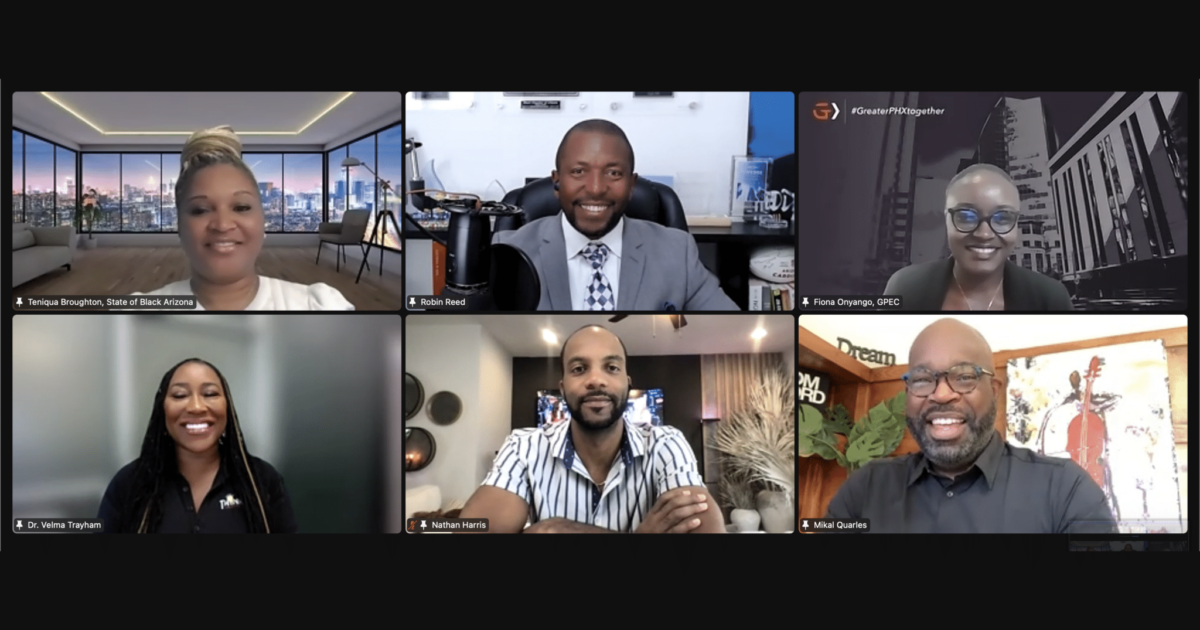

Regional Report: State of Black Business 3.0
Published: 09/05/2023
How Black entrepreneurship opportunities have increased in Arizona
The third State of Black Business Report, created in tandem between the State of Black Arizona and Greater Phoenix Economic Council (GPEC), emphasized supplier diversity, reviewed venture capital (VC) and other funding opportunities, and highlighted growth in the Black business community since the launch of the first report in 2021.
“It's important to recognize the actionable steps taken by community leaders and organizations in response to our previous reports,” said State of Black Arizona CEO Teniqua Broughton. “Their efforts have illuminated gaps, challenges, and most importantly, opportunities within the State of Arizona.”
Local Black leaders joined GPEC for a panel discussion on the findings and opportunities for continued movement outlined in the report, which had input and support from the Black Chamber of Arizona, JP Morgan Chase and Salt River Project (SRP). The panel consisted of:
- Teniqua Broughton, Executive Director, State of Black Arizona
- Nathan Harris, General Partner, Immersion; CEO, Ease
- Fiona Onyango, Research Analyst, Greater Phoenix Economic Council
- Mikal Quarles, Managing Director and Head of Diverse Strategies, JP Morgan Chase
- Dr. Velma Trayham, CEO and Founder, ThinkZilla Consulting Group and Millionaire Mastermind Academy
- Robin Reed, President and CEO, Black Chamber of Arizona (Moderator)
“We will continue supporting the community by conducting more research for whatever’s necessary so that all players make data-informed decisions,” Onyango said. “We cannot emphasize enough the role of partnerships and collaborations. This, I believe, is the key to success in Arizona.”
Read the State of Black Business 3.0 report here
Supplier diversity in Greater Phoenix
Supplier diversity initiatives, which originated in government contracting and small business funding in the 1960s, involve the purchasing of goods and services from businesses owned and operated by minority groups. The region’s supplier diversity programs aim to build a supply chain that secures the inclusion of underrepresented groups. In doing so, communities gain economic and social security while boosting business opportunities.
IMPACT AZ 2025, Greater Phoenix’s first supplier diversity program that works exclusively with Black entrepreneurs, was created in response to the State of Black Business Report 2.0 and launched in April 2023 with more than 50 participating businesses receiving curriculum and mentorship.
As these opportunities are created, established companies can find ways to hire and promote Black enterprises. Trayham, who is the founder and president of IMPACT AZ 2025, also advised businesses to establish measurements of success and track data of the hiring of minority contractors and entrepreneurs.
“I hear, ‘We can’t find Black businesses’ — well, they’re out there,” Trayham said. “Making an intentional effort to engage them and to also be a resource to them is very important.”
A heightened focus on supplier diversity can improve the widening gap between population share and business representation found in the 2023 Brookings report on Black businesses. This is especially pronounced in entrepreneurship levels of Black women. While this demographic accounted for 7% of the United States total population and 13.9% of U.S. women, they ran only 0.91% of all businesses and 4.34% of women-owned companies.
There is promise, though — Black women-owned employer businesses increased by 18.14% from 2017-20 and 17% of Black women in the U.S. are starting or running new businesses, a larger figure than White women or White men.
There are more than 52,000 employer businesses owned by Black women, but the first few years are crucial to determining long-term success — only 3% of Black women-owned companies survive longer than five years.
Venture capital and other funding options
While venture capital funding is an attractive form of private equity for companies with long-term growth potential, entrepreneurs need to ensure that their business is ready before engaging in the VC space.
Harris advised having a strong understanding of your business model, identifying what venture capitalists are looking for and how your business matches their goals, and the market conditions. VC funding may not be the best route for everyone.
“Venture capital was originally created to help bring back junk portfolios and junk bonds as a way to rebound rapidly, so the concept was (to) invest in something we can disrupt the market with, we’ll get a high level of growth and then we’ll sell it off to a buyer,” Harris said.
“You’re not looking to build a legacy business with venture – you're looking to scale fast and return a lot of capital in a short period of time.”
It may be prudent to apply for funding through a community development financial institution (CDFI) or a traditional bank. Grants are available for small businesses, and entrepreneurs can become involved in innovation labs for partnerships and connections. Business owners find more success in receiving funding, whether through VC, traditional banking, or other means, when they collaborate with partners.
“Startups with two or more founders in partnership raise more capital than an individual founder,” Quarles said. “As we make the decision to say, ‘Hey I’m just gonna hustle and grind’ … statistically, you’re also saying ‘I’m gonna be less likely to get the capital I need’ because from a representation standpoint, the capital goes to those that have strategic partnerships and initiatives that allow them to scale and grow.”
Government funding is more likely to come if the entrepreneur is developing a business in an industry that the state is actively working to grow, such as advanced manufacturing, healthcare and biomedical, and clean tech. Innovative solutions to region-wide priorities are attractive to the state.
“When you’re solving a problem … money will follow you,” Trayham said. “A lot of people go into business based on the money they think they can make. Well, when you identify the problem that you’re solving, then money will follow.”
View the report to see some of the programs arising around the state that help fund or educate Black- and minority-owned businesses.
Growth in recent years
Since the launch of the first State of Black Business Report, we have seen growth in the Black business community. CDFIs are listening to people on the ground and adjusting lending terms, increasing access to capital.
In addition to Thinkzilla’s response to the 2022 State of Black Business report, launching IMPACT AZ in 2023, community organization Blax Friday launched the first Black business database in Arizona and partnered with State of Black Arizona to identify more than 1,200 Black-owned businesses around Arizona, primarily in Greater Phoenix and Tucson.
New proposed updates to the Community Reinvestment Act (CRA), a law enacted in 1977 that assesses federal banking practices, promote community engagement and financial inclusion with adherence to modern banking practices and encourage additional investment into minority-owned businesses.
Quarles said JPMorgan Chase has changed lending practices, engagement models and supply chain initiatives while requiring less documentation so it can respond to credit requests faster and increase the percentage of majority-minority applications. Now, he says, minority entrepreneurs need to take the next step to receive those funds.
“Hold us accountable — but a part of holding us accountable is remaining engaged with us,” Quarles said. “If you tell me you’re holding me accountable to do something different, and then turn a blind eye as I finally say, ‘Hey, I heard you and we will do something different,’ and then you don’t know that I’m doing it. Then nobody’s benefitting from the effort.”
Meet the Panel
Teniqua Broughton
Executive Director
State of Black Arizona
Nathan Harris
General Partner, Immersion
CEO, Ease
Fiona Onyango
Research Analyst
Greater Phoenix Economic Council
Mikal Quarles
Managing Director and Head of Diverse Strategies
JP Morgan Chase
Dr. Velma Trayham
CEO and Founder, ThinkZilla Consulting Group
CEO and Founder, Millionaire Mastermind Academy
Robin Reed (Moderator)
President and CEO
Black Chamber of Arizona





